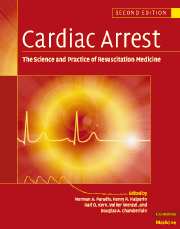Book contents
- Frontmatter
- Contents
- List of contributors
- Foreword
- Preface
- Part I Introduction
- Part II Basic science
- Part III The pathophysiology of global ischemia and reperfusion
- Part IV Therapy of sudden death
- 23 Prevention of sudden cardiac death
- 24 Sequence of therapies during resuscitation: application of CPR
- 25 Transthoracic defibrillation
- 26 Automated external defibrillators
- 27 Public access defibrillation
- 28 The physiology of ventilation during cardiac arrest and other low blood flow states
- 29 Airway techniques and airway devices
- 30 Manual cardiopulmonary resuscitation techniques
- 31 Mechanical devices for cardiopulmonary resuscitation
- 32 Invasive reperfusion techniques
- 33 Routes of drug administration
- 34 Adrenergic agonists
- 35 Vasopressin and other non-adrenergic vasopressors
- 36 Antiarrhythmic therapy during cardiac arrest and resuscitation
- 37 Acid–base considerations and buffer therapy
- 38 Cardiac arrest resuscitation monitoring
- 39 Special considerations in the therapy of non-fibrillatory cardiac arrest
- 40 Cardiocerebral resuscitation: a new approach to out-of-hospital cardiac arrest
- 41 Thrombolysis during resuscitation from cardiac arrest
- 42 Percutaneous coronary intervention (PCI) after successful reestablishment of spontaneous circulation and during cardiopulmonary resuscitation
- 43 Emergency medical services systems and out-of-hospital cardiac arrest
- 44 In-hospital resuscitation
- 45 Complications of CPR
- 46 Bringing it all together: state-of-the-art therapy for cardiac arrest
- Part V Postresuscitation disease and its care
- Part VI Special resuscitation circumstances
- Part VII Special issues in resuscitation
- Index
34 - Adrenergic agonists
from Part IV - Therapy of sudden death
Published online by Cambridge University Press: 06 January 2010
- Frontmatter
- Contents
- List of contributors
- Foreword
- Preface
- Part I Introduction
- Part II Basic science
- Part III The pathophysiology of global ischemia and reperfusion
- Part IV Therapy of sudden death
- 23 Prevention of sudden cardiac death
- 24 Sequence of therapies during resuscitation: application of CPR
- 25 Transthoracic defibrillation
- 26 Automated external defibrillators
- 27 Public access defibrillation
- 28 The physiology of ventilation during cardiac arrest and other low blood flow states
- 29 Airway techniques and airway devices
- 30 Manual cardiopulmonary resuscitation techniques
- 31 Mechanical devices for cardiopulmonary resuscitation
- 32 Invasive reperfusion techniques
- 33 Routes of drug administration
- 34 Adrenergic agonists
- 35 Vasopressin and other non-adrenergic vasopressors
- 36 Antiarrhythmic therapy during cardiac arrest and resuscitation
- 37 Acid–base considerations and buffer therapy
- 38 Cardiac arrest resuscitation monitoring
- 39 Special considerations in the therapy of non-fibrillatory cardiac arrest
- 40 Cardiocerebral resuscitation: a new approach to out-of-hospital cardiac arrest
- 41 Thrombolysis during resuscitation from cardiac arrest
- 42 Percutaneous coronary intervention (PCI) after successful reestablishment of spontaneous circulation and during cardiopulmonary resuscitation
- 43 Emergency medical services systems and out-of-hospital cardiac arrest
- 44 In-hospital resuscitation
- 45 Complications of CPR
- 46 Bringing it all together: state-of-the-art therapy for cardiac arrest
- Part V Postresuscitation disease and its care
- Part VI Special resuscitation circumstances
- Part VII Special issues in resuscitation
- Index
Summary
Introduction
Although there is persuasive evidence that the administration of adrenaline during CPR favors the success of electrical defibrillation as well as the return of pulsatile rhythm, its more ultimate benefit on survival is unproven. To the contrary, the more recent discovery of reversible myocardial dysfunction after successful resuscitation from cardiac arrest initially in experimental models and subsequently in human patients led to a re-examination of its role. Although there is only indirect evidence that impaired myocardial function accounts for early death, the high correlation between the severity of myocardial impairment and decreased survival supports this assumption. Accordingly, postresuscitation myocardial dysfunction may therefore explain, at least in part, the high fatality rate within the initial 72 hours after successful resuscitation from cardiac arrest such that fewer than 5% of victims recover to be discharged from the hospital without major impairment.
The immediate effort during CPR is to restore blood flows to sustain the functions of vital organs, and most especially, to the heart and the brain prior to successful restoration of spontaneous circulation. Blood flow to the vital organs during CPR is contingent primarily on the cardiac output generated by precordial or direct cardiac compression and by the resistance in the systemic arterial bed. Yet the cardiac output that is generated by precordial compression represents only approximately 25% to 30% of normal values. Vasopressor drugs increase arterial and arteriolar vasoconstriction, and thereby produce increases in aortic diastolic pressure.
- Type
- Chapter
- Information
- Cardiac ArrestThe Science and Practice of Resuscitation Medicine, pp. 639 - 646Publisher: Cambridge University PressPrint publication year: 2007



